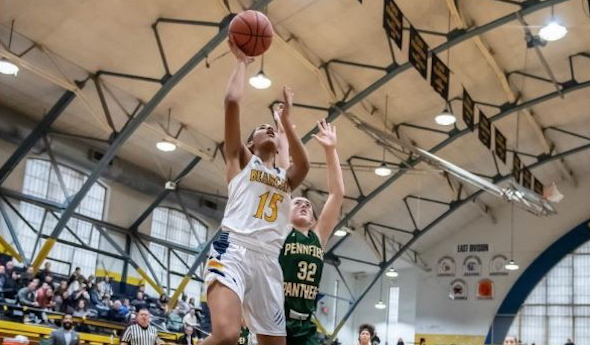
Hoops Finds Annual Home During Holidays
December 27, 2019
By Ron Pesch
Special for Second Half
Nothing says the Holidays like a high school basketball tournament.
It started, like many things do, with a drip. Well, make that a dribble.
The Michigan High School Athletic Association has allowed Holiday basketball tournaments for years. When was the first? That’s hard to establish. No one really kept track of such. A 1934 Wakefield News article indicates that a “Christmas Tournament will be held for the (Gogebic) Range teams at Wakefield December 27 and at Ironwood December 28.” Hurley, Bessemer, Ironwood and Wakefield were entered in the “blind” tournament, with opponents drawn just before game time. It was a new idea, at least in the Upper Peninsula.
“Nothing of its kind has ever been attempted in the Peninsula before,” stated the Ironwood Daily Globe. The tournament, won by Hurley, was a financial success. After expenditures, including the purchase of trophies, profit equaled enough that $22.42 was distributed to each school competing in the tournament. Plans were announced to bring back the tournament in a larger format the following year. It did return the following December, with the same teams in the same format but with all games played in Wakefield. This time out, Ironwood topped Hurley 22-21 for the tournament title.
In the Lower Peninsula in 1935, an All-Berrien County Holiday tournament was held Dec. 26, 27 and 28, with Three Oaks winning the Class B-C division title, 15-13 in the final over Berrien Springs. St. Joseph Catholic emerged as the Class D victor with a surprising 27-26 win over the reigning MHSAA state champ from Stevensville. The 14-team competition was played at Niles High School. Attendance was “slim, very slim” for the opening day of the tourney. The event did not return in 1936.
A similar, but much smaller, event was staged in Berrien County in 1941 with the Bridgman Class C Invitational. The tournament featured seven teams with contests spread over three nights. It was a success.
“Some 450 paid admissions were checked in Wednesday night for the championship finals, which Bridgman won from Berrien Springs. … The total paid admission for the three night event was 1,420 fans with a gross gate of approximately $400.”
By the mid-1940s, the idea of playing prep basketball during the Christmas lull had begun to take off across the state.
In December 1946, before a crowd of 1,500 at the Flint IMA Auditorium, Holland, the reigning Class A champion, downed Flint Northern 51-48 behind a pair of late field goals by Ken ‘Fuzz’ Bauman in the first annual Motor City Invitational. In Jackson, Detroit Catholic Central won the Michigan Catholic Invitational, beating Kalamazoo St. Augustine, 42-40. Bridgman again snagged the title at the Sixth Annual Berrien Class C Christmas Holiday Tournament. It was the Bees’ third Christmas championship in four years. The Little Eight Conference Holiday Tournament was played across four school gymnasiums as the calendar transitioned from 1946 to 1947. Bangor downed Covert, 34-29, in the championship contest hosted at Watervliet High School on Saturday, Jan. 4.
“Holiday tournament basketball has really caught on in Michigan,” said Hal Schram in the Detroit Free Press in 1947. “There will be no Christmas-New Year’s rest for at least 60 Michigan high school squads which have jumped at the chance to sharpen their collective shooting eyes for the long season ahead. … At last count, tournaments will be played between Dec 17 and Jan 3 at Flint, Saginaw, Grand Rapids, Jackson, Lincoln Park, Fremont, Negaunee, Marquette, Benton Harbor and Detroit.”
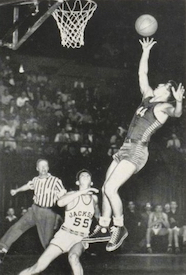 The same eight schools that played at the first Motor City tournament – Jackson, Grand Rapids Central, Holland, Muskegon Heights, Monroe, Midland, Flint Central and Flint Northern – were invited back for the second year. According to Schram, “Not a single participating school of a year ago wanted to be left out.”
The same eight schools that played at the first Motor City tournament – Jackson, Grand Rapids Central, Holland, Muskegon Heights, Monroe, Midland, Flint Central and Flint Northern – were invited back for the second year. According to Schram, “Not a single participating school of a year ago wanted to be left out.”
Jackson downed Flint Northern in the title game, 39-34.
The Saginaw Invitational, hosted at Arthur Hill High School, boasted six Class A schools as well as Alma and Mount Pleasant, both Class B schools. Mount Pleasant surprised the field, winning the tournament with a 40-25 triumph over Dearborn Fordson in the championship game.
A year later in December, Schram wrote, “The Michigan High School Athletic Association wasn’t caught unaware when the tournament bug started to bite every sector of the state.”
“Never did we expect such a wave of tournament play as we will see during the next three weeks,” said Charles Forsythe, state director for the MHSAA, noting 34 Christmas vacation tournaments were scheduled between December 15 and January 8 during the 1948-49 basketball season. “Perhaps we’re lucky at that. The Oklahoma association has had to sanction 123 tournaments.”
Forsythe and Schram explained the reasons for the wave of popularity. Of particular interest was the fact that, at the time, a school sponsoring both football and basketball could play a total of no more than 24 games, combined, in the two sports. However, MHSAA rules allowed a basketball team the chance to play as many as three games during a Holiday tournament and be charged with only one of its allotted combination of 24 contests. (The MHSAA rules changed prior to 1972-73 to allow basketball teams a maximum of 20 games.)
Coaches could keep their squads sharp during the two-week layoff with games rather than just mandatory practices. And, as a bonus to all because tournaments were financed through gate admissions, invitations to larger tournaments meant teams got to “stay and eat at the best hostelries, go on sightseeing tours when not playing and play non-conference opponents from other sections of the state.“
Add in the chance to play before larger-than-normal crowds, and the formula for a successful tournament was cast.
Beginning with the 1950-51 season, the football-basketball rule was altered to count play in mid-season invitational tournaments as two contests. With the change, according to the Detroit Times, “the number of such meets dropped sharply.”
Only nine Holiday tournaments, involving 50-plus teams, were recorded by the MHSAA during the 1951-52 season: the 5th annual Flint Parochial Invitational, the Alpena Catholic Invitational (involving 16 teams), the 5th Annual Greater Lansing Invitational, the Albion College Invitational, the Twin-Five Conference Christmas Tournament (a 10-team replacement for the disbanded Little Eight Conference’s tournament), the Otisville Invitational, the Columbiaville Invitational and the 1st Annual Portland St. Patrick Christmas Invitational.
But by the 1960s, Holiday Tournaments were again regaining popularity, with more now focused on teams from a specific community or section of the state, especially among smaller schools.
The St. Patrick tournament was still going strong in 1966 – its 15th year – with an eight-team, four-day design. Williamston downed a Cinderella squad from Carson City, 64-44, before 1,100 fans at Portland to earn the championship. Other Mid-Michigan holiday tournaments played out in Chelsea and Swartz Creek at the same time.
The Flint Parochial League Tournament was a mainstay of the Holiday season until the breakup of the league in the early 1970s.
“Basketball tournaments have become popular around the state and nation in recent years,” wrote Wendy Foltz, longtime Battle Creek Enquirer sports editor, before the kickoff of the inaugural Battle Creek Central Holiday Cage Tournament in 1968. In a twist that harkened back to earlier days, the eight-team event represented nearly every section of lower Michigan. “Battle Creek never has been a rabid basketball town like some around the state,” added a hesitant Foltz, noting a hope that the event could at least break even.
Hosted at the Cereal City’s historic Fieldhouse, built in 1928, that first tournament was won by host Battle Creek Central, which downed Traverse City 71-53 before a crowd of 2,000. Phil Todd led the Bearcats with 29 points, including 21 in the first half, while 6-foot-8 Tom Kozelko paced TC with 24. Muskegon Heights won the consolation game, holding off a late Ypsilanti Willow Run rally, 78-77. Other schools competing were Battle Creek Lakeview, Grand Blanc, Romulus and recently-opened Jackson Lumen Christi.
Chuck Turner, Central’s head coach, and junior varsity coach Jack Schils had contacted 60 schools during the summer of 1967 to organize the 12-game schedule.
“The response was terrific,” said Schils, who added, “Many schools could not accept because of schedule commitments but want to enter a year hence.”
The Battle Creek tournament was back in 1969, again hosting teams from near and far. Schils noted that cost ran high when teams were brought in from long distances: “However, this type of tournament is highly desirable so we hope fans will support it.”
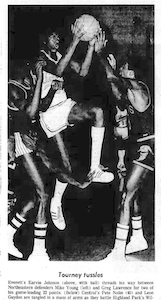
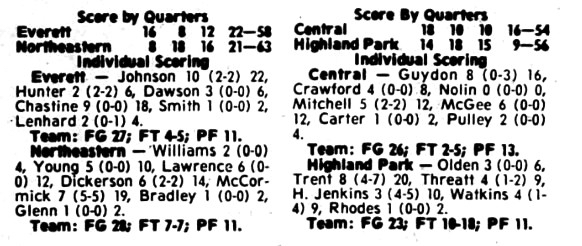 But the event was discontinued following the 1970-71 season when the “eight team format became too unwieldy,” according to the Enquirer “… and both crowd and the quality of play declined.”
But the event was discontinued following the 1970-71 season when the “eight team format became too unwieldy,” according to the Enquirer “… and both crowd and the quality of play declined.”
Pared down to a four-team format, it returned in a big way in December 1975. The tournament saw standing-room-only crowds of more than 3,000 for games between Battle Creek Central, Detroit Northeastern, Class A quarterfinalist Lansing Everett and reigning Class A champion Highland Park.
Detroit Northeastern downed Lansing Everett, 63-58 for the Cereal City championship trophy. Everett junior Earvin Johnson scored 22 points and, with teammate Reggie Chastine, was named to the all-tournament team along with Northwestern’s Wilbert McCormick, the tourney MVP, and his teammate Greg Lawrence. Highland Park’s William Trent and Battle Creek Central’s Leon Guydon also were named to the team.
By the 1980s, it seemed that the Christmas break nearly mimicked March in Michigan.
“I think a Christmas tournament really helps your program,” said Turner in 1980 to the Enquirer. He had taken over the head coaching position at Battle Creek in the fall of 1967 after a successful stint at Willow Run. “I don’t understand basketball teams having a preseason, playing three or four games, then taking two weeks off. When you get back, it’s like starting over.”
Besides Turner’s squad, the 1980 field included Detroit Western, Detroit Murray Wright and eventual winner Kalamazoo Central. The event would ultimately be re-christened the Battle Creek Central Chuck Turner Holiday Classic.
“The late Chuck Turner started bringing big games to the city over the holidays when he first started at the school in the 1960s,” wrote Bill Broderick in the Enquirer in 2018.
“Chuck started this because he wanted to give people the chance to come back home for the holidays and see everyone play. It’s been like a family reunion over the years,” Fred Jones told Broderick. Jones was a longtime assistant to Turner. “That we can keep it going in his name is great and hopefully we can keep if going for another 50 years.”
The girls are now part of the action. All five Battle Creek city schools – Central, Pennfield, Harper Creek, Lakeview, and St. Philip – were part of the event in 2018.
This year the Chuck Turner Central Field House Holiday Classic will again span two days – December 27 and 28 – and will again see all five city schools play on the historic floor.
Other Holiday tournaments scheduled this year include:
Petoskey Invitational – December 13-14
Raider Shootout – December 21
18th Annual Muskegon Area Sports Hall of Fame Classic – December 27
Earl McKee Classic – December 27-28
North Farmington Holiday Extravaganza – December 27
Motor City Roundball Classic – December 27
Cornerstone Invitational – December 27
Washtenaw Hoops Showcase – December 28
 Ron Pesch has taken an active role in researching the history of MHSAA events since 1985 and began writing for MHSAA Finals programs in 1986, adding additional features and "flashbacks" in 1992. He inherited the title of MHSAA historian from the late Dick Kishpaugh following the 1993-94 school year, and resides in Muskegon. Contact him at [email protected] with ideas for historical articles.
Ron Pesch has taken an active role in researching the history of MHSAA events since 1985 and began writing for MHSAA Finals programs in 1986, adding additional features and "flashbacks" in 1992. He inherited the title of MHSAA historian from the late Dick Kishpaugh following the 1993-94 school year, and resides in Muskegon. Contact him at [email protected] with ideas for historical articles.
PHOTOS: (Top) The Battle Creek Central and Pennfield girls face off during the 50th Chuck Turner Classic. (Middle) Shaheen Shaheen scores two points for Flint Northern, which fell to Jackson 39-34 during the 1947 Motor City championship game. (Below left) Lansing Everett’s Earvin Johnson makes a move toward the basket against Detroit Northeastern during the 1975 Battle Creek event. (Below right) Box scores from the 1975 tournament include Johnson’s 22 points in the 63-58 loss. Photos courtesy of the Battle Creek Enquirer, Lansing State Journal and Ron Pesch archives.)
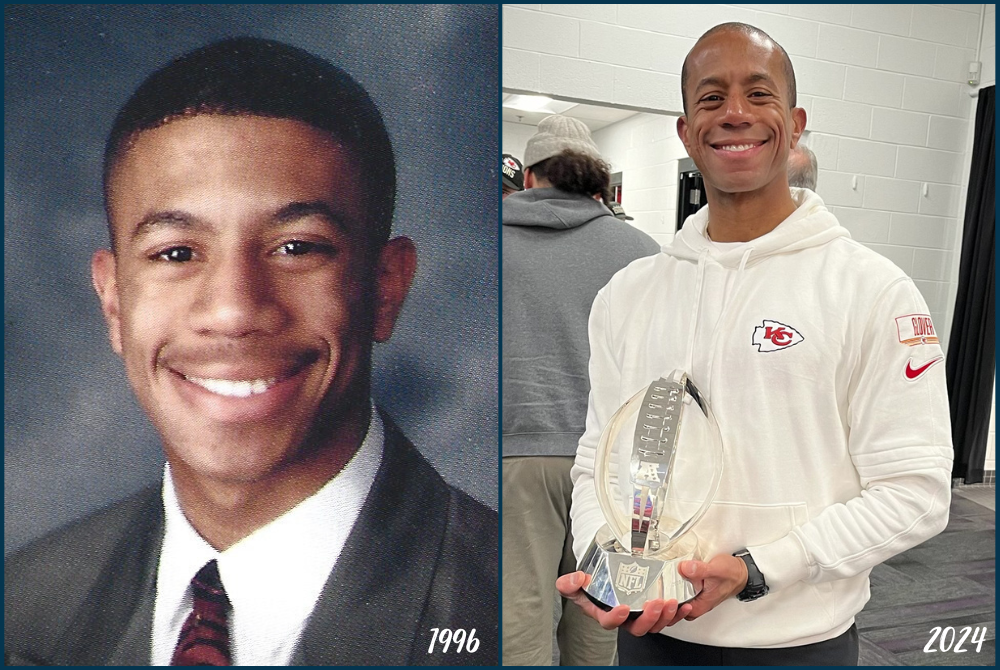
MCC's Glover Fills Key Role as Athletic Trainer for Super Bowl Champions
By
Tom Kendra
Special for MHSAA.com
August 6, 2024
David Glover never had the glamour role – and didn’t even play the glamour sport – during his high school days at Muskegon Catholic Central.
 MCC is known statewide as a football powerhouse that ranks third in state history with 12 MHSAA Finals championships during the playoff era. But basketball was Glover’s sport of choice, and his specialty didn’t show up in the box score.
MCC is known statewide as a football powerhouse that ranks third in state history with 12 MHSAA Finals championships during the playoff era. But basketball was Glover’s sport of choice, and his specialty didn’t show up in the box score.
“I was the defensive stopper,” explained Glover, who graduated from MCC in 1996. “I was always the guy that Coach (Greg) Earnest would put on the other team’s best scorer. I took a lot of pride in that.”
Glover continues to be the ultimate team player, only now his role is the first assistant athletic trainer for the Kansas City Chiefs, who are aiming to three-peat this season as Super Bowl champions.
“As the team and the goals have grown, so have I,” said Glover, who has been on the Chiefs’ training staff for the past 18 years. “The job is the same, which is getting the players onto the field and back onto the field after injuries so that they can perform at their highest level. I have become more comfortable and experienced in that role.”
Glover broke into the NFL as an athletic training intern with the New York Jets in 2004. He came to Kansas City in 2006 when Jets head coach Herman Edwards took the KC job, bringing Glover and several other members of the training staff with him.
Glover quickly fell in love with the Chiefs’ famous family-first culture, along with the area’s world-famous barbecues. He also met his future wife, Jera.
He is known as a tireless worker and student of his craft, which has allowed him to steadily move up to his current position as first assistant athletic trainer on the Chiefs’ five-member training staff, second only to Rick Burkholder, the vice president of sports medicine and performance.
Glover’s skills also have caught the attention of his colleagues across the NFL, who awarded him the 2022 Tim Davey AFC Assistant Athletic Trainer of the Year Award – given annually to someone who represents an unyielding commitment, dedication and integrity in the profession of athletic training.
Glover said a big reason for his success in his profession can be traced back to high school.
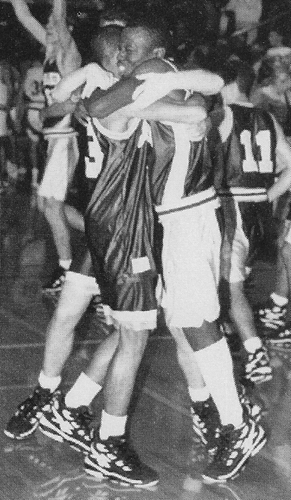 “Playing sports at MCC, especially for a smaller school, gave me such a sense of camaraderie, teamwork and a family outside of my normal family,” said Glover, the son of David and Lyndah Glover. “Those teammates energized me to be my best.
“Playing sports at MCC, especially for a smaller school, gave me such a sense of camaraderie, teamwork and a family outside of my normal family,” said Glover, the son of David and Lyndah Glover. “Those teammates energized me to be my best.
“There’s no doubt that some of the lessons that I learned playing sports in high school help me out in my job.”
Glover also ran track for the Crusaders – competing in the long jump, 200 meters, 400 meters and various relays – and said he enjoyed himself, even though he ran track initially as a way to stay in shape for basketball.
The highlight of his MCC basketball career came his senior year, when the underdog Crusaders captured a Class C District championship.
Growing up in Muskegon and close to Lake Michigan, Glover thought he would become a marine biologist someday – that is, until he suffered an injury during his senior basketball season.
Glover went up for a block and actually pinned the opponent’s shot against the backboard. However, the shooter inadvertently took his legs out on the play, causing him to crash violently to the court and lose feeling in his right leg for about 10 seconds.
The injury to his hip flexor put him on crutches for two weeks and off the court total for about a month, which he said “felt like the end of the world” at the time.
But the injury led him into rehab with Brian Hanks, a 1988 MCC graduate who was back working at his alma mater as an athletic trainer through Mercy Hospital.
Glover and Hanks turned out to be a perfect match. Glover was naturally curious about the entire process and wanted to know the “why” of his rebab program. Hanks recognized Glover’s interest in how the human body works and encouraged him to consider studying athletic training in college.
“God works in mysterious ways,” said Glover. “I was devastated when I got injured, but that experience opened my eyes to a whole new career. I wanted to learn everything I could about the human body and how it works.
“Looking back, the injury was a blessing in disguise. I wouldn’t change anything at all.”
Glover followed in Hanks’ footsteps and attended Central Michigan University, spending countless hours in the training room working with athletes in every sport – from football to track to gymnastics – graduating with a degree in health fitness and exercise science.
He said a huge inspiration in his career was CMU professor Dr. Rene Shingles, who in 2018 became the first African-American woman to be inducted into the National Athletic Trainers Association Hall of Fame. Shingles encouraged Glover to continue his studies at Seton Hall University in New Jersey, where he earned his master’s of science in athletic training.
He got his break into the NFL with his internship with the Jets, and his work ethic has kept him there for the past 20 years.
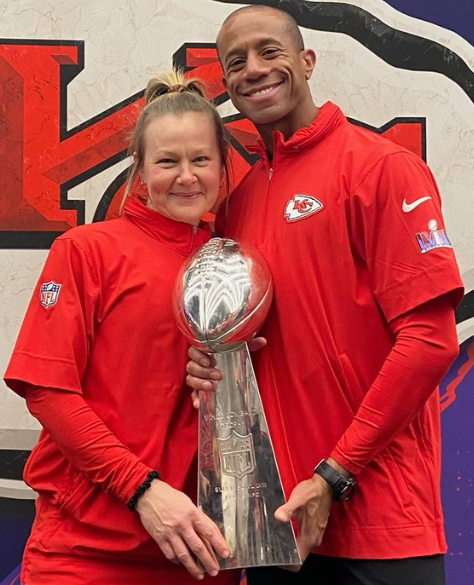 “If there are high school kids out there reading this, I guess I would tell them that there are a lot of different avenues to get to the NFL or the NBA,” Glover said. “I’m a perfect example. I didn’t even play high school football, but through athletic training I have been part of three Super Bowls.”
“If there are high school kids out there reading this, I guess I would tell them that there are a lot of different avenues to get to the NFL or the NBA,” Glover said. “I’m a perfect example. I didn’t even play high school football, but through athletic training I have been part of three Super Bowls.”
The Chiefs, who won their first Super Bowl way back in 1970, would have to wait 50 years (until 2020) to win their next one. But Kansas City now has won three Super Bowls in five years, adding titles in 2023 and 2024.
“To have these kind of experiences, and to be able to share so much of it with my family, is really a dream come true,” said Glover, 45, who said his ultimate goal is to become the head athletic trainer for an NFL team.
“I am always open to see what opportunities God has for me and what doors he opens.”
More immediately, with the start of training camp last month, Glover is back to his seven-day-a-week schedule, sharing the organization’s goal of making it to the Super Bowl for the third consecutive season.
Glover has worked with all of the Chiefs star players at some point, including star quarterback Patrick Mahomes, who he calls “a great, humble man.”
But perhaps the player he has worked with most is standout tight end Travis Kelce.
Kelce, who has become a huge name outside of football as the boyfriend of pop sensation Taylor Swift, injured his knee during his rookie preseason in 2013, sidelining him for the entire year. Glover was assigned to Kelce for his rehab.
With Glover’s daily help, Kelce was able to get back on the field the following year and emerged as a star, earning him the 2014 NFL Ed Block Courage Award as a model of inspiration, sportsmanship and courage.
After winning the award, Kelce invited Glover (he calls him “DG”) and his wife to attend the award ceremony with him in Baltimore.
“That was a huge honor for me, and I was blown away,” said Glover. “I look at it that I was just doing my job. He entrusted and believed in me throughout the process, and it worked out great.”
2024 Made In Michigan
August 1: Lessons from Multi-Sport Experience Guide Person in Leading New Team - Read
July 30: After Successful 'Sequel,' Suttons Bay's Hursey Embarking on Next Chapter - Read
July 24: East Kentwood Run Part of Memorable Start on Knuble's Way to NHL, Olympics - Read
July 22: Monroe High Memories Remain Rich for Michigan's 1987 Mr. Baseball - Read
July 17: Record-Setting Viney Gained Lifelong Confidence at Marine City - Read
July 11: High School 'Hoop Squad' Close to Heart as Hughes Continues Coaching Climb - Read
July 10: Nightingale Embarking on 1st Season as College Football Head Coach - Read
June 28: E-TC's Witt Bulldozing Path from Small Town to Football's Biggest Stage - Read
PHOTOS (Top) At left, David Glover as a senor during the 1995-96 school year at Muskegon Catholic Central, and at right Glover shows the AFC Championship trophy after Kansas City's 17-10 win at Baltimore on Jan. 28. (Middle) Glover, left, hugs teammate Doug Dozier after a victory over rival Muskegon Mona Shores in 1995-1996 basketball season opener. MCC finished 17-7 and a District champion. (Below) Glover poses with this year's Super Bowl Championship trophy alongside fellow Chiefs athletic trainer Julie Frymyer. (Trophy photos courtesy of David Glover; 1996 photos courtesy of the MCC yearbook.)

